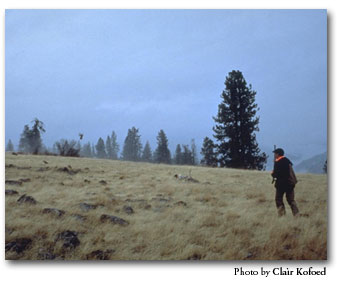 |
|
|
If you invest in finding places to hunt on your own prior to your hunting, and you will be doubly rewarded. Get a good map of your suspect areas and do some sleuth work by calling around (state game departments, sporting goods stores, other hunters, etc.) to find a good general hunting area. I have had my best luck if I can get through to the upland bird biologist at the state game department, who is usually a bird hunter. Chukar hunting means lots walking up and down steep hills, so try to figure out whether information offered is authentic. Ask lots of questions. Get details, if possible. One hunting partner, who networks year round, doesn't look for a person who will tell him where to hunt chukars, he wants someone who will go out there with him and show him!
You may be able to locate and contact an experienced chukar hunter with knowledge of the area you have chosen. Hunters that I know are usually willing to help a fellow hunter out if they take time to introduce themselves, and listen more than they talk. However, it is unrealistic to expect that you will find out exactly where to hunt. Remember that anyone willing to tell you where to hunt may be just as willing to tell the next person, too. When was the last time you told a total stranger how to find your special hunting spots? Right.
Some Essential Equipment
The basics for arid country bird hunting include water for you and your dog, lunch for you both, a sturdy pair of hiking/hunting boots, a hunting vest to carry your gear, and hopefully your birds, and a lightweight double gun or automatic.
Water is important, arid country and hard walking requires you, and especially your dog, to rehydrate frequently. I carry five gallons of water in my truck, and two quart bottles in my vest. My dogs drink most of the water. Only fair, since they are doing most of the work. They also get about half of my lunch, also fair.
Boots are very important. Opinions vary, but most agree that an boot that is ankle high or higher, well fitted and broken in, with a stiff sole and Vibram or air-bob type soles is most effective. Remember this is not trial hiking, but cross country walking with lots of sharp broken rock, thorns and cactus. Danner boots are popular with chukar hunters. If you use shorter, ankle high boots, consider a short pair of gaiters to keep out rocks, weed seeds, and other irritants.
The hunting vest is an item that should be carefully considered. You will load it with water, shells, lunch, whistle, lead, first aid kit, compass… and birds - you may be carrying ten pounds or more by the end of the day.